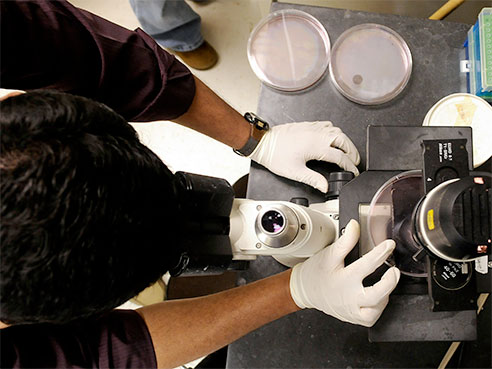 The two new programs will allow students the opportunity to experience collaboration in the classroom and lab as early as freshman year. Plans to continue to strengthen interdisciplinary undergraduate education at the University of Alabama at Birmingham are taking a step forward with the establishment of two new undergraduate degree programs — Genetics and Genomic Sciences and Immunology.
The two new programs will allow students the opportunity to experience collaboration in the classroom and lab as early as freshman year. Plans to continue to strengthen interdisciplinary undergraduate education at the University of Alabama at Birmingham are taking a step forward with the establishment of two new undergraduate degree programs — Genetics and Genomic Sciences and Immunology.
Both undergraduate programs are enrolling students for the fall 2017 semester.
As shared majors between the College of Arts and Sciences and School of Medicine, the two new programs will allow students the opportunity to experience collaboration in the classroom and lab as early as freshman year.
“Students will get a firsthand look at how science can be used in medicine, taking ideas from the classroom into the lab, and then applying them to real-life scenarios,” said Steven Austad, Ph.D., distinguished professor and chair of the Department of Biology within the College of Arts and Sciences. “We’re taking steps to provide undergraduate education here at UAB that will prepare our students for the highest level of graduate and professional school experiences.”
Genetics and Genomic Sciences
A fundamental aspect of all biological processes that touches nearly all facets of human life, the study of genetics and genomics impacts the health and well-being of individuals, communities and entire populations. UAB, Alabama’s leading provider of genomic and personalized medicine, recently launched the Alabama Genomic Health Initiative in partnership with HudsonAlpha Institute for Biotechnology.
As practices such as genetic testing and genome sequencing become more prevalent, the demand for qualified and experienced genetics researchers and health professionals will continue to rise. The UAB program is designed to facilitate a new generation of undergraduates who will be ideally equipped to pursue and succeed in the growing field.
| “Our graduates will be able to go on from here and become nurses, physicians and genetic counselors, or they might choose to pursue graduate studies in basic research, enter the pharmaceutical industry or join a biotechnology startup — the need for professionals with this knowledge base is really great right now, so the number of opportunities that will be open to them really are endless.” |
“We believe this program will attract the best and the brightest students, and the career prospects will exist at many different levels,” said Bruce Korf, M.D., chair of the Department of Genetics. “Our graduates will be able to go on from here and become nurses, physicians and genetic counselors, or they might choose to pursue graduate studies in basic research, enter the pharmaceutical industry or join a biotechnology startup — the need for professionals with this knowledge base is really great right now, so the number of opportunities that will be open to them really are endless.”
The genetics and genomic sciences program will operate as a collaborative effort between the Department of Genetics in the School of Medicine and the Department of Biology in the College of Arts and Sciences. Students will participate in courses taught by experts from across campus, providing access to high-level, multidisciplinary instruction as an undergraduate.
Immunology
| The immunology major will give students the opportunity to learn about and contribute to research in the field of immunology earlier than other general degrees, and is the only one of its kind in the Southeast, and one of a handful nationwide. |
Focusing on the function of the immune system, which protects us from infectious diseases and cancer and is critical for the health of the world’s population, the undergraduate immunology program was developed in response to growing interest from current undergraduate students.
The undergraduate immunology program is designed to provide research opportunities and an intensive, immunology-focused course of study for students interested pursuing careers in immunology and health-related professions, including medicine, biomedical research, science education, policy and writing.
The program is an interdisciplinary effort between the School of Medicine’s Department of Microbiology and the College of Arts and Sciences’ Department of Biology.
“This represents a true collaboration between the departments of Biology and Microbiology,” said Frances Lund, Ph.D., chair of the Department of Microbiology. “We believe this unique educational opportunity will not only attract students who are passionate about science and medicine, but will perfectly prepare those students to take on the scientific and clinical challenges of the 21st century here in Alabama and across the world.”
The immunology major will give students the opportunity to learn about and contribute to research in the field of immunology earlier than other general degrees, and is the only one of its kind in the Southeast, and one of a handful nationwide.